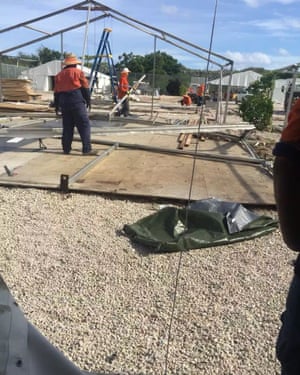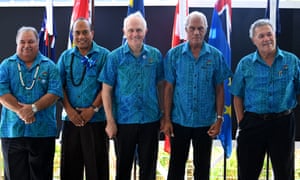The forum brings together nations from the Pacific, but the location this year means not everyone is welcome
What is the Pacific Islands Forum?
Of all the meetings on the world’s crowded diplomatic calendar, this is the one where the colourful shirts are most appropriate.The Pacific Islands Forum is a regional intergovernmental organisation, and is held every year between the leaders of 18 countries from across the Pacific. The smallest member country is Niue, population 1,600, and the largest is Australia at more than 25 million people.
Established in 1971 “to work in support of member governments, to enhance the economic and social wellbeing of the people of the South Pacific”, the PIF also attracts observers, such as the UN and World Bank, and dialogue partners, including China, India, the US and UK.
The PIF gives Pacific island countries a united voice on the global stage, and a greater say in advocating for their own futures. The theme for the Nauru meeting is “Building a strong pacific: our people, our islands, our will”.
And the Pacific Islands Forum is in Nauru this year?
The choice of Nauru as host nation marks the island nation’s 50th year of independence. About the same size as Tullamarine airport in Melbourne, the tiny country has been a German colony, a League of Nations mandate, occupied by the Japanese, and a UN trust territory under Australian administration, before going it alone in 1968.Why is Nauru’s hosting of the forum controversial?
One obvious problem is lack of access. Nauru is essentially off limits to journalists and external scrutiny. The country is currently experiencing a slow-burning crisis in its democracy: judges have been sacked, ministers investigated for massive alleged corruption, and parliamentarians suspended and pursued through the courts for opposing the executive. Countries such as New Zealand have suspended all aid to Nauru’s justice sector, citing an erosion of the rule of law, after judges were summarily sacked for making decisions the government disagreed with. There is an underlying power play between the president, Baron Waqa, and his justice minister, David Adeang, that many on the island say will erupt sooner rather than later.
But Australian interest is most intense because of the detention centres on the island. Only a handful of Nauru- and Australian-government approved journalists have been allowed to visit, and the harsh conditions in the camp – as well as the fact of being held indefinitely on the island – have caused significant mental health issues among the detained population. The mental health of children is particularly acute, with almost daily incidents of self-harm and suicide attempts, and children removed from the island by federal court order in Australia, after ruling they are not safe, and cannot be properly treated, in Nauru.
The Nauruan government has torn down the “family camp” – where families had been living in mouldy tents for five years – in the last week, moving asylum seeker and refugee families into accommodation in the north-east of the island.
Why is the forum important?
These are countries that generally have a difficult time being heard on the world stage. In a global order dominated by the military and economic superpowers, Pacific Island nations are small and remote, with little economic or geopolitical muscle. They also suffer development and governance challenges so any chance to grab the attention of the rest of the world is a positive.As the forum said before this year’s meeting, Pacific Island countries face serious challenges related to geography, such as small land mass, limited natural resources, geographic isolation, and vulnerability to natural disasters. “Other challenges are a product of the global economic system, which was not designed with Pacific Island countries in mind,” it said.
What are the major issues the Pacific Islands Forum addresses?
Issues around governance and development – such as improving healthcare, women’s rights and education – are regularly addressed by the Pacific Island leaders. Four pillars were identified in the 2005 Pacific Plan: “Economic growth, sustainable development, good governance, and security.”But two issues stand out, for their impact and intractability.
- Oceans
Pacific Islands depend on their seas for survival, and rampant overfishing by larger countries – with bigger ships and greater technology – have imperilled these countries’ economies, even their ability to feed themselves. - Climate change
The Pacific is the region of the world that has produced the least amount of carbon emissions, but its citizens have been the first to feel its effects, and most acutely. Australia’s inability to authoritatively deal with emissions reductions has led to significant criticism of it from forum members.

No comments:
Post a Comment